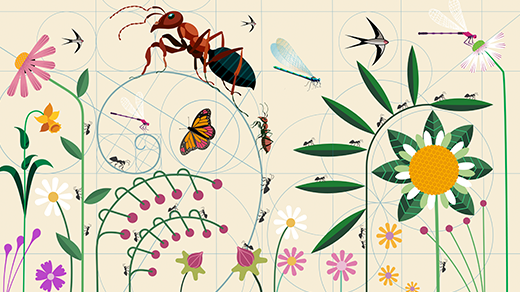What's up in
Insects
Latest Articles
Does Form Really Shape Function?
From brain folds to insect architecture, L. Mahadevan explains how complex biological forms and behaviors emerge through the interplay of physical forces, environment and embodiment.
The Hidden World of Electrostatic Ecology
Invisibly to us, insects and other tiny creatures use static electricity to travel, avoid predators, collect pollen and more. New experiments explore how evolution may have influenced this phenomenon.
How Is Flocking Like Computing?
Birds flock. Locusts swarm. Fish school. From chaotic assemblies of life, order somehow emerges. In this episode, co-host Steven Strogatz interviews the evolutionary ecologist Iain Couzin about how and why collective behaviors arise.
A Multitalented Scientist Seeks the Origins of Multicellularity
The pathbreaking geneticist Cassandra Extavour pursues the secrets of multicellular life while balancing careers in both science and singing.
Why Insect Memories May Not Survive Metamorphosis
The reshuffling of neurons during fruit fly metamorphosis suggests that larval memories don’t persist in adults.
A Mutation Turned Ants Into Parasites in One Generation
A new genetics study of ant “social parasites” shows how complex sets of features can emerge rapidly and potentially split species.
Ants Live 10 Times Longer by Altering Their Insulin Responses
Queen ants live far longer than genetically identical workers. Researchers are learning what their longevity secrets could mean for aging in other species.
How Supergenes Fuel Evolution Despite Harmful Mutations
Supergenes that lock inherited traits together are widespread in nature. Recent work shows that their blend of genetic benefits and risks for species can be complex.
How Do Fireflies Flash in Sync? Studies Suggest a New Answer.
Field research suggests a new explanation for the synchronized flashing in fireflies and confirms that a novel form of “chimeric” synchrony occurs naturally.








